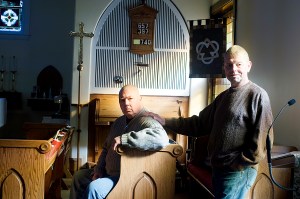Paul Libby was prepared for the challenges he would face when he walked away from prison.
He knew finding a place to live would be tough and finding a job would be even tougher.
“I had a lot of anxiety when I was about to be released,” Libby said. “I did not know where I was going to go.”
He had been locked up for 14 years and had very little contact with the outside world. Transitioning to life beyond prison is never easy, said Calvin Dube of Cell to Street Ministry Outreach.
Dube knows. He served time himself. But when Dube left prison, it was different.
“I had a family. I was very lucky,” said Dube of Lewiston. “My family loved me and helped me.”
Libby’s release was similar to many. His family lives out of state and he had no one to correspond with about life on the outside.
Dube runs Cell to Street, a prisoner re-entry program. Caseworkers of prisoners make contact with Dube when an inmate’s sentence is about to end.
Libby started writing letters to Dube about one year before his release from prison.
Dube said he opens about four letters a week from prisoners and he writes to about 25 inmates per month.
“I stay connected with people who got out 20 years ago,” said Dube, who recently threw away six trash bags of inmate letters.
Dube kept a shopping bag full of the letters that mean the most. “Harold was one of my treasures,” Dube said as he read the poem that Harold wrote to Dube for Fathers Day. Dube estimated that he has received 2,000 letters from inmates over the past 20 years.
“Their greatest fear is coming back to the community,” Dube said. “They worry about very elementary stuff that we take for granted.”
Moving back to their communities is not easy for former inmates, Dube said. “People don’t want them; police don’t want them.” Dube said that even getting a meal at a soup kitchen can be tough because others may remember or recognize them.
“Start planning,” Dube tells those nearing the end of their sentences. “It’s never too early.”
“I did a lot of prep before I got out,” Libby said. “It took one year to get all my paperwork in order.” Social Security card, birth certificate and military discharge papers were items that Dube advised Libby to get taken care of before his release date.
“The No. 1 thing that you need to have is a birth certificate,” Dube said.
Letters from Dube were always opened by Maine State Prison personnel in front of Libby, who was never allowed to keep the envelopes.
Dube said the proposed rule changes that would not allow inmates to communicate with the outside community is a big concern.
Through letters, Dube helps inmates find resources such as housing, employment, health care and family support.
“Proposed changes would greatly limit an inmate’s ability to access necessary transition resources before release,” Dube wrote in a letter to the Maine Department of Corrections.
“I never thought I would live through it,” Libby said of life in prison. “It was Thomaston, Shawshank, real prison.”
Libby served time for a sex offense. “It’s the lowest rung. You are one step up from dog (crap),” is how Libby described the treatment of sex offenders in prison.
“I was given the tools (in treatment) to make sure I never have a new victim,” Libby said.
Libby “is an example of someone who has done exceptionally well,” Dube said.
Dube encourages released inmates to be resourceful and not to rely on others. “I am not your father. I am not your caseworker,” Dube reminded a 23-year-old man that he is helping to transition back into the community.
“I really want to make a difference,” Dube said. “Not just for myself, but to change the process of how men come home.”
Cell to Street Ministry will host a Christmas dinner for released inmates on Dec. 12 at St. Michael’s Episcopal Church in Auburn.


Comments are no longer available on this story